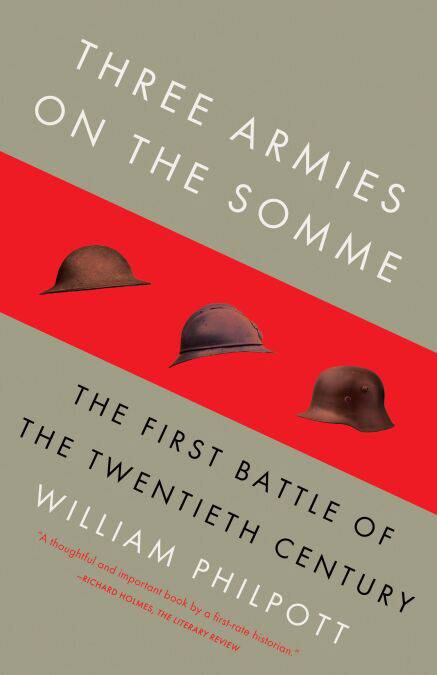
- Afhalen na 1 uur in een winkel met voorraad
- Gratis thuislevering in België vanaf € 30
- Ruim aanbod met 7 miljoen producten
- Afhalen na 1 uur in een winkel met voorraad
- Gratis thuislevering in België vanaf € 30
- Ruim aanbod met 7 miljoen producten
Zoeken
Three Armies on the Somme E-BOOK
The First Battle of the Twentieth Century
William Philpott
E-book | Engels
€ 8,06
+ 8 punten
Uitvoering
Omschrijving
For decades, the Battle of the Somme has exemplified the horrors and futility of trench warfare. Yet in Three Armies on the Somme, William Philpott makes a convincing argument that the battle ultimately gave the British and French forces on the Western Front the knowledge and experience to bring World War I to a victorious end.
It was the most brutal fight in a war that scarred generations. Infantrymen lined up opposite massed artillery and machine guns. Chlorine gas filled the air. The dead and dying littered the shattered earth of no man’s land. Survivors were rattled with shell-shock. We remember the shedding of so much young blood and condemn the generals who sent their men to their deaths. Ever since, the Somme has been seen as a waste: even as the war continued, respected leaders—Winston Churchill and David Lloyd George among them—judged the battle a pointless one.
While previous histories have documented the missteps of British command, no account has fully recognized the fact that allied generals were witnessing the spontaneous evolution of warfare even as they sent their troops “over the top.” With his keen insight and vast knowledge of military strategy, Philpott shows that twentieth-century war as we know it simply didn’t exist before the Battle of the Somme: new technologies like the armored tank made their battlefield debut, while developments in communications lagged behind commanders’ needs. Attrition emerged as the only means of defeating industrialized belligerents that were mobilizing all their resources for war. At the Somme, the allied armies acquired the necessary lessons of modern warfare, without which they could never have prevailed.
An exciting, indispensable work of military history that challenges our received ideas about the Battle of the Somme, and about the very nature of war.
It was the most brutal fight in a war that scarred generations. Infantrymen lined up opposite massed artillery and machine guns. Chlorine gas filled the air. The dead and dying littered the shattered earth of no man’s land. Survivors were rattled with shell-shock. We remember the shedding of so much young blood and condemn the generals who sent their men to their deaths. Ever since, the Somme has been seen as a waste: even as the war continued, respected leaders—Winston Churchill and David Lloyd George among them—judged the battle a pointless one.
While previous histories have documented the missteps of British command, no account has fully recognized the fact that allied generals were witnessing the spontaneous evolution of warfare even as they sent their troops “over the top.” With his keen insight and vast knowledge of military strategy, Philpott shows that twentieth-century war as we know it simply didn’t exist before the Battle of the Somme: new technologies like the armored tank made their battlefield debut, while developments in communications lagged behind commanders’ needs. Attrition emerged as the only means of defeating industrialized belligerents that were mobilizing all their resources for war. At the Somme, the allied armies acquired the necessary lessons of modern warfare, without which they could never have prevailed.
An exciting, indispensable work of military history that challenges our received ideas about the Battle of the Somme, and about the very nature of war.
Specificaties
Betrokkenen
- Auteur(s):
- Uitgeverij:
Inhoud
- Aantal bladzijden:
- 656
- Taal:
- Engels
Eigenschappen
- Productcode (EAN):
- 9780307593726
- Verschijningsdatum:
- 4/10/2010
- Uitvoering:
- E-book
- Beveiligd met:
- Adobe DRM
- Formaat:
- ePub

Alleen bij Standaard Boekhandel
+ 8 punten op je klantenkaart van Standaard Boekhandel
Beoordelingen
We publiceren alleen reviews die voldoen aan de voorwaarden voor reviews. Bekijk onze voorwaarden voor reviews.








